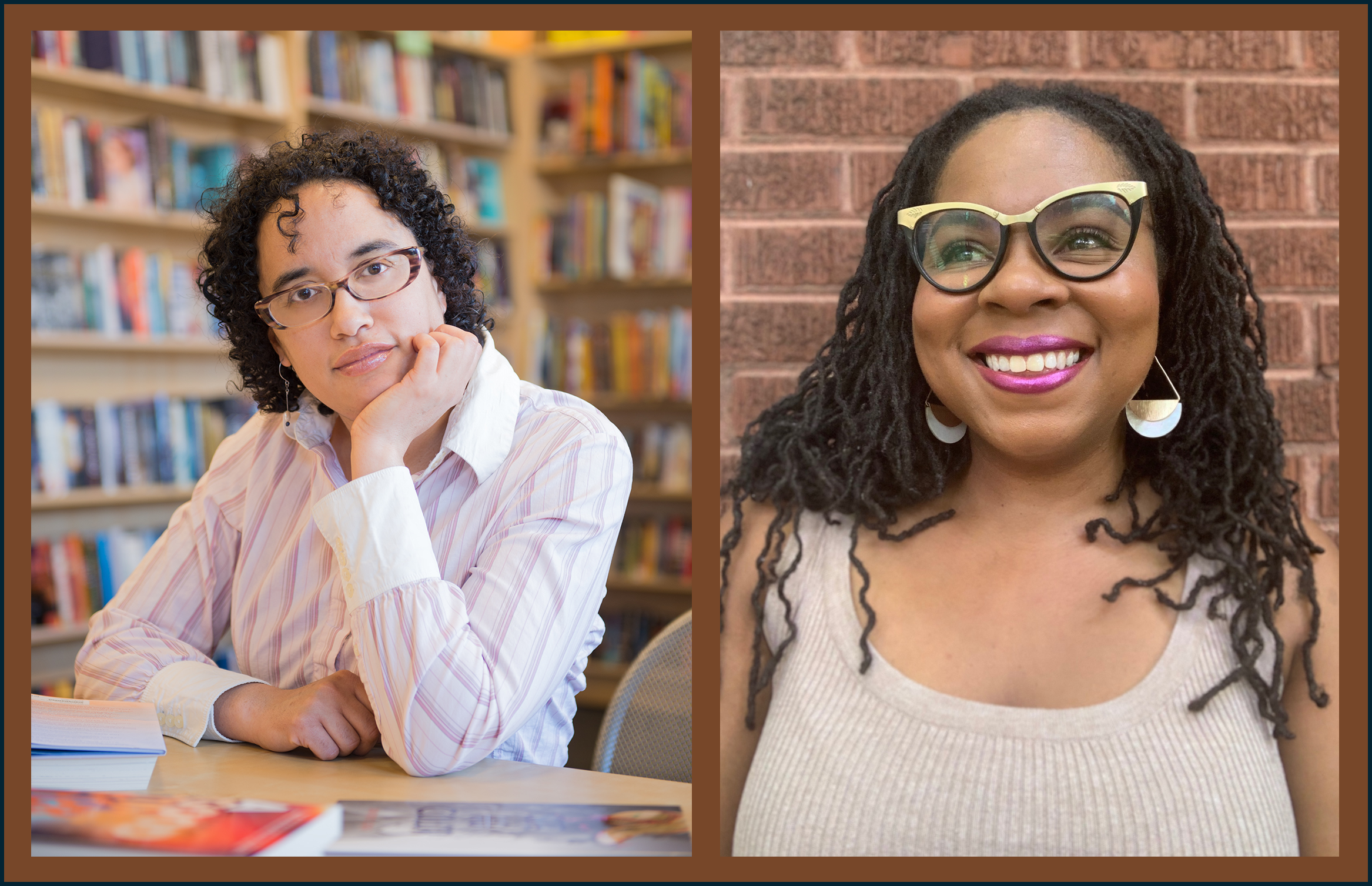 As more and more adoptees get published or share their stories, the response from readers and gatekeepers in kidlit publishing is often fraught with hurt feelings and a limited understanding of the nuances of the adoptee experience. In this conversation, Shannon Gibney and Mariama J. Lockington—two authors, scholars, and transracial adoptees—dive into how this tension impacts their lives, their community building, and the stories they tell.
As more and more adoptees get published or share their stories, the response from readers and gatekeepers in kidlit publishing is often fraught with hurt feelings and a limited understanding of the nuances of the adoptee experience. In this conversation, Shannon Gibney and Mariama J. Lockington—two authors, scholars, and transracial adoptees—dive into how this tension impacts their lives, their community building, and the stories they tell.
___
SG: So I want to talk to you, Mariama, about representations of adoptees in kidlit, particularly transracial adoptees, or TRAs. As a Black TRA who frequently writes characters who are Black TRAs…as a critical thinker, community member, and scholar…what are your overall thoughts about that?
ML: Yeah, so many thoughts! Growing up, I don’t think I encountered a book with a character that had a similar representation as me. Now that I write for young people, and I write about the nuances of the adoptee experience, I’m even more critical…I love to read YA and middle grade, and even sometimes picture books just for my own research and pleasure reading. And I have to say, I am even more critical when I encounter adoptees in kidlit that are not written by adoptees, and have maybe done minimal to no research about the adoptee experience. I am immediately turned off. And it’s hard for me to stay within the story because I think that there’s a lot of…It’s just really one-dimensional when it comes to those characters and those stories. And also, often problematic. I think I’ve encountered more Korean adoptees within stories for young adults, and a lot of times I’m also turned off when it’s like, “Oh, this character is adopted, but she loves her family, and it doesn’t affect her.” And it’s just sort of a brush over, and there’s absolutely no nuance or understanding.
SG: I’d like to drill down a little bit more, and ask you: What are the specific kinds of tropes of adoption that you often see deployed in kidlit? I see a lot of the dominant stories of adoption in this space as exactly what you say: Love can conquer all, the colorblindness narrative…
ML: More love, like you get two times the love, which I hate.
SG: [laughs] Yeah.
ML: I see a lot of, “Well, she’s adopted, but family isn’t about blood, or whatever.” In books where there is a reunion of sorts, that is also very watered down, or the first parent is dead, which is very convenient.
SG: Yeah, birth parents are pretty much erased in these stories.
ML: Birth parents are almost nonexistent, and if they are there at all, the trope is, “Well, they gave you a better life. Or, they did a selfless thing. Or, they loved you so much they gave you away.”
SG: We can talk about non-adoptee writers using these tropes, which happens a lot. But also, I feel like the stories that tend to get through the publishing process (and publishing is not easy, as we know…It’s really an endurance sport, and it is about access), it does become very clear which stories are palatable and which stories are not palatable. I’ve heard stories and I’ve had experiences where a white adoptive parent, usually a white adoptive mother is an editor at a publishing house, and is like, “Well, this is great writing, but I don’t understand why this story is all about race. And why is this character so angry? My Chinese daughters will never blah, blah, blah…”
ML: Oh my God.
SG: I just had somebody tell me that this was the feedback that they got from prospective publishers on their memoir. And this is 2024. So, it does sometimes feel like a minefield. But even still, there’s just a lot more adoptee BIPOC kidlit writers who are really taking this stuff on today and flipping the script in important ways, but there are also these books that are coming out occasionally by adoptees that just reinscribe these same problematic tropes that we’re talking about. So, it does feel very fraught in that way.
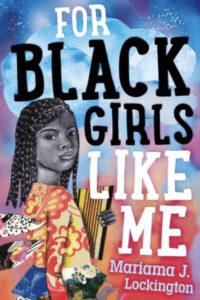 ML: Well, I think that’s also the hard part of navigating the publishing industry as an adoptee writer, and as a BIPOC adoptee writer. Hopefully, you find an editor that you feel safe with and comfortable with, but you don’t know along the process whose feelings might get hurt by the nuanced experiences that you’re putting into your characters. I have a really good relationship with my editor, but I think she was surprised when For Black Girls Like Me got its first trade review, and it was not a good review. She was really upset about it. She was like, “This doesn’t affect the quality of this book, and I’m really mad about this.” And the review really honed in on some of the brutal racist moments my character endures from her family, and also from the outside. And the reviewer was angry about it. And I’m not going to say that I was happy about getting a bad review, but I think as an adoptee, and someone who has been in conflict with parents, and other white folks, and has had lots of conversations with white adoptive parents, I knew writing this book was going to hurt some feelings, and cause some push back – especially from white adoptive parents about what they believe to be the experience of my character, or Black adoptees growing up in white families. So, my response to my editor was, “Yeah, that’s a bummer, but this book wasn’t for them.”
ML: Well, I think that’s also the hard part of navigating the publishing industry as an adoptee writer, and as a BIPOC adoptee writer. Hopefully, you find an editor that you feel safe with and comfortable with, but you don’t know along the process whose feelings might get hurt by the nuanced experiences that you’re putting into your characters. I have a really good relationship with my editor, but I think she was surprised when For Black Girls Like Me got its first trade review, and it was not a good review. She was really upset about it. She was like, “This doesn’t affect the quality of this book, and I’m really mad about this.” And the review really honed in on some of the brutal racist moments my character endures from her family, and also from the outside. And the reviewer was angry about it. And I’m not going to say that I was happy about getting a bad review, but I think as an adoptee, and someone who has been in conflict with parents, and other white folks, and has had lots of conversations with white adoptive parents, I knew writing this book was going to hurt some feelings, and cause some push back – especially from white adoptive parents about what they believe to be the experience of my character, or Black adoptees growing up in white families. So, my response to my editor was, “Yeah, that’s a bummer, but this book wasn’t for them.”
SG: I love that response.
ML: I’m open to constructive feedback, it’s not that my books are perfect, but I think I hit a nerve. And then, I’ve read some Goodreads reviews of that book, and people don’t self-identify as white adoptive parents, but they’re mad that the adoptee’s story isn’t the common narrative they have in their mind.
SG: You can usually tell right away – white adoptive parents don’t understand that. It’s like, “Okay, we know ya’ll!” We know the tenor of the so-called ‘critique,’ which is really about their own issues and their own investments in whiteness, and a certain narrative of the white family as savior. So, in some sense if you’re not reproducing that, that’s when you’re going to get those kinds of responses.
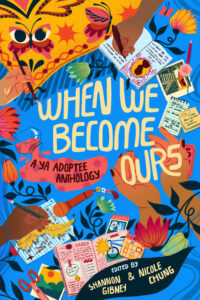 SG: One thing I talk about with other BIPOC adoptee writers about, some of whom are in the anthology I edited with Nicole Chung, When We Become Ours, is the way in which tropes of adoption are used mostly by non-adoptee writers in not sophisticated or interesting ways. There’s all these other ways that you can narratively explore the nuances of adoption, but people will just be like, “Oh, this person is mentally ill or has psychological problems, and that’s because they were adopted!”
SG: One thing I talk about with other BIPOC adoptee writers about, some of whom are in the anthology I edited with Nicole Chung, When We Become Ours, is the way in which tropes of adoption are used mostly by non-adoptee writers in not sophisticated or interesting ways. There’s all these other ways that you can narratively explore the nuances of adoption, but people will just be like, “Oh, this person is mentally ill or has psychological problems, and that’s because they were adopted!”
ML: I know! I was going to say that that’s also a trope: The f’d up adoptee character who has all these problems, and it’s just because of their adoption. But there’s no nuance as to what’s really going on here. I’ve actually seen this with writers who are not white and not adoptees, it’s romanticized. They think: “Wouldn’t it be cool to find out I had a whole other family.” Or, “Wouldn’t it be cool to find out I was adopted?”
SG: Oh my God. People say that, and you’re just like, “Stop.”
ML: I don’t think that’s always ill-intentioned, but I do think it’s a narrative trap that sometimes authors of all races who aren’t adopted fall into if they’re not aware of or have never spoken to an adult adoptee. They’ll be like: “Well, this is a cool thing I can put in my story. Or maybe a dramatic thing I can put in my story. Or maybe it would be fun to add a secret sister!” Without thinking about what that really means for the character, or for people who have grown up in that particular situation. I see this on TV, too.
SG: Oh, it’s all over.
ML: Like, I’ll be watching a show, and all of the sudden I’ll be like, “Oh no.”
SG: You want to tear your hair out. Like, “This again?!” And I have to say in kidlit though, especially in middle grade, the orphan trope. Less so in YA…And writers who I feel like have a critical lens on other things, like race, gender, sexuality, class, nationality. But suddenly when it comes to termination of parental rights…I think it’s because as I understand it, a lot of kidlit back in the day was like, “Well, you have to have the kids on their own in your stories to make them good.” So then it was like, “Oh, what a great way to do that by making them orphans!” And it’s like, “No.” [laughs]. There’s so many layers that need to be unpacked. And it’s probably an unpopular opinion, but it’s just bad writing.
ML: Well, it’s bad writing, and it’s not curious at all. And it’s also really frustrating for me to encounter stories where the only thing about that character is that they are adopted. It’s obviously an important thing, but there’s so many layers to a character. And if the only part of the character is that they’re adopted, and they’re fine with it, and they have twice the love, that’s boring – on just a writing level, that’s boring.
SG: It is!
I think of somebody like Stefany Valentine, in her story “Almost Close Enough,” in When We Become Ours, and she turns the adoptee experience into this beautiful and strange metaphor. Of this girl who’s living on Earth in the future, but she’s from a moon colony. Her adoptive parents are from a different moon colony, they’re not “white” in this way, they’re not native to Earth either, so they’re “almost close enough.” But they’re not. Which mimics Stefany’s experience as I understand it, of half-white, half-Vietnamese TRA. That’s really interesting! That’s a really interesting way to explore all these fissures and nuances and connections.
ML: Yes, it is! And that’s the problem— if you’re not writing from experience, or your only understanding of adoption is from watching This Is Us, you’re going to miss opportunities for the kind of nuance and creativity Stefany writes so expertly into her story.
So, you asked a question earlier about how do we, as adoptees and allies, mobilize around this issue of adoptee representation in kidlit…I love and appreciate when you post on social media about books with adoption themes that are coming out, and call people in who are working in this area.
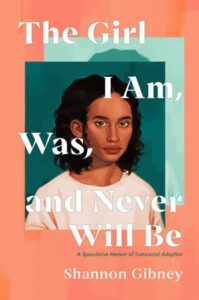 SG: [laughs] Sometimes I wonder if I’m making myself a pariah, but at this point, I’m 49 years old, I’m a mid-career writer, and I don’t really care. I’m just like, I can do this in a nice and respectful way, hopefully, but just to be like, “This is a problem, writers and publishing!” And also, to let them know that we’re watching. I’m not going to sit here and pretend that I don’t see this, and that this is okay with me. Because where does that get us?
SG: [laughs] Sometimes I wonder if I’m making myself a pariah, but at this point, I’m 49 years old, I’m a mid-career writer, and I don’t really care. I’m just like, I can do this in a nice and respectful way, hopefully, but just to be like, “This is a problem, writers and publishing!” And also, to let them know that we’re watching. I’m not going to sit here and pretend that I don’t see this, and that this is okay with me. Because where does that get us?
ML: I don’t know how we mobilize, but I do think that us being here, being loud and talking about it counts…it’s also work and emotional labor. But I think a lot of the time, people just have not thought critically at all about adoption, because of the narratives we’re fed.
I’m married to someone who has said, “Yeah, before we got into a relationship, I had a very narrow understanding of adoption. And I’ve educated myself, and learned a lot.” So, most people just don’t think beyond: “Oh, this kid needs a home, and they get saved,” or whatever. Most people just don’t have a critical lens. So, when they encounter a story that’s written by an adoptee and is nuanced, it’s jarring. Like, people are mad that For Black Girls Like Me has a parent in it who has a mental health crisis. And I’m like, “Oh, so you don’t think that there are children who are adopted who are growing up with parents who are struggling with mental illness? Or are narcissists? That doesn’t exist?!”
SG [Laughs] No! There are no narcissists anywhere in American culture!
ML: So, it’s just ongoing conversations with people. I’m also a queer person, but in some ways I feel like I’m always coming out as an adopted person. Or, I’ll find myself at a table with people and they’re like, “Oh, my son and his wife are adopting.” So, it’s everywhere. And the response is always “Oh, you’re so brave,” or “that’s such a wonderful thing you’re doing for a child.” And I think part of the pushback is that people get defensive about how much they don’t know. We have to say, “That’s actually really a one-dimensional understanding of what adoption is. Do you have any friends who are adopted? Have you talked to them about that?”
So, I think one of the answers to combatting this one-dimensional adoptee narrative is more of us, writing our stories, or getting published, or publishing ourselves, or seeking community and platforms that will highlight our work. I think the work that you’re doing, and the anthology is so important. Doing things like writing this blog post also helps. And then when we encounter people who are even slightly open, if we have the energy and capacity, to just be like, “Well, if you read that book, maybe try this other one.”
I also think talking to young people in generations that are coming up is important. I feel like that’s why it’s important to write for young people in some capacity. The things that young people pick up on in my stories that adoptive parents and adults don’t pick up on is pretty astounding. It’s frustrating that adult readers and publishing experts can’t seem to be as open as kids.
SG: I mean, publishing is a mess, been a mess. At the same time that you’re trying to do this thing, you’re in it, in some ways you’re complicit, you also have to understand that publishing is not the reason why you’re telling these stories. And that then makes it easier for you to really write them in ways that might make certain people who are gatekeepers and have a lot of power in publishing, it might make them uncomfortable.
One thing I do feel like has happened more, is when people see someone like you or me, mid-career writers, and other TRA and BIPOC adoptee writers will come up to me and ask for advice. And I think that’s really useful, so that people know, “Okay yeah, I’m getting this pushback. I’m getting stonewalled, but this person did it. So, there’s ways around it.” I’m so glad that there’s adoptee work like Mark Oshiro’s—
ML: And Meredith Ireland’s.
SG: Right! Where even 10 years ago, there weren’t as many of us doing this work. And every year there’s more of us.
ML: The thing I love about there being more of us every year is that there are definitely common threads in our experiences, but we are all individual people. Adoptees are not a monolith. I think that the more of our stories that get out there, the less adoptive parents will look at our fictional or hybrid stories and be like, “Oh, this is a parenting book.” They really seem to think, “If I just read every story from When We Become Ours, then I will know exactly how my adopted Black child is feeling, and then I’ll have the answer, and I won’t have to deal with this stuff (this race stuff, or this adoptee stuff).” And the point we are trying to make as adoptee writers is, there are commonalities that allow us to be seen by each other, but no, we’re not all the same and we’re finding innovative, creative ways to share these nuances—we’re writing fiction, we’re also writing poetry. And that’s important, too – that outlet.
___
Shannon Gibney is a writer, educator, activist, and the author of See No Color (Carolrhoda Lab, 2015), and Dream Country (Dutton, 2018) young adult novels that won Minnesota Book Awards in 2016 and 2019. Gibney is faculty in English at Minneapolis College, where she teaches writing; she was recently selected as one of three Educators of the Year in the entire Minnesota State College and University system. A Bush Artist and McKnight Writing Fellow, her novel, The Girl I Am, Was, and Never Will Be, explores themes of transracial adoption through speculative memoir (Dutton, 2023) and won a Michael L. Printz Honor. Gibney’s other recent publications include the picture books Sam and the Incredible African and American Food Fight (University of Minnesota Press, 2023), and Where We Come From (Lerner, 2022; coauthored), and a YA anthology of stories by adoptees about adoptees, co-edited with Nicole Chung (HarperTeen, 2023).
Mariama J. Lockington is an adoptee, author, and educator. Her middle-grade debut, For Black Girls Like Me, earned five starred reviews and was a Today Show Best Kids’ Book of 2019. Her sophomore middle-grade book, In The Key of Us, is a Stonewall Honor Award book and was featured in the New York Times. Her debut young adult novel, Forever is Now, is the 2024 winner of the Schneider Family Book Award. Mariama holds a Masters in Education from Lesley University and a Masters in Fine Arts in Poetry from San Francisco State University, she calls many places home, but currently lives in Kentucky with her wife and an abundance of plants. When Mariama is not writing, she works as the Director of the Professional Learning Series at the University of Kentucky’s College of Education.

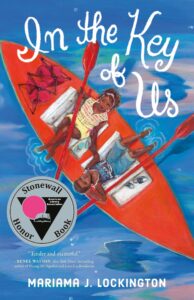
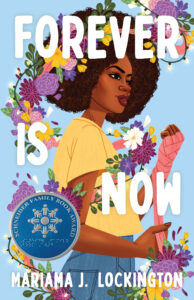
I’m a birth mother. I met my daughter in 1990. She was 23. I was 23 when I had her. I hadn’t read any books about adoption until after we met. (That would be an interesting discussion I’ve never had.) Though I’ve taught children’s literature, I never even thought about looking for books about adoption in any category of children’s literature. The books I read after we met:
Birthbond/Gediman & Brown. The Girls Who Went Away/Fessler. Perspectives on a Grafted Tree/comp. Johnston. 2 pamphlets by Adoption Forum, Phila./15 Years of Shared Experience, & Years of Shared Experience. These are still on my bookshelf. I read The Other Mother/Schaefer(I think. Had to sort it out from horror movies, novels, & Coraline) I found a book at our local library decades ago. Nonfiction. About the adopted child’s emotional development & understanding & feelings about the other mother who is always out there. My memory is that it was excellent. It was descriptive & not judgmental. I looked for it several years ago but didn’t find it.
My daughter sent this to me. Am sure we’ll have important conversation. And more so because her mother died 2 weeks ago. We have a good relationship. But there was a time even recently I had to remind my children that she is 1/2 me. The same as they are. And she shouldn’t be an afterthought when family events are planned. They got it. They should have gotten it sooner than at 43, 49 & 51.
We are in a good place, despite significant bumps. My daughter & I still say how lucky we are. We were both painted the rosy picture. Now I plan to buy your books & read them too! Thank you.
Thanks for this – I’m always thoughtful about how I include foster children in books (since being a fostering sibling is part of my personal history) but I’m glad to see more and more adoptees – especially transracial ones – finding space and courage to tell their stories. I read my first Shannon Gibney book years ago, and I’m glad to see she’s kept it real, and kept writing. Thanks, all.